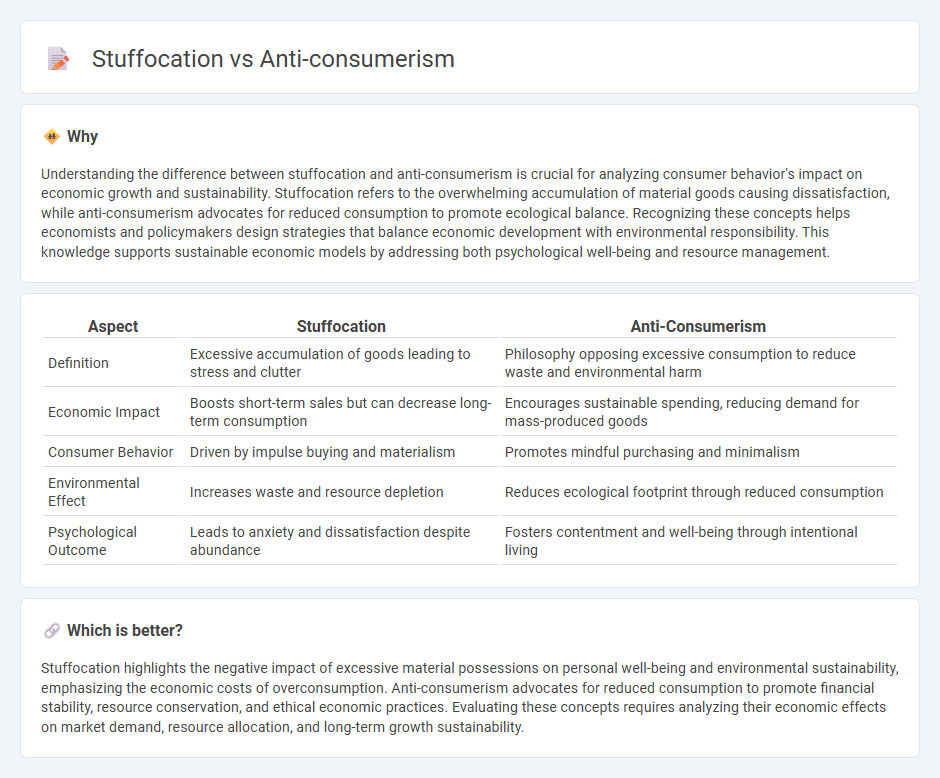
Stuffocation refers to the overwhelming accumulation of material possessions that leads to stress and dissatisfaction, highlighting the economic impact of excessive consumerism. Anti-consumerism advocates for minimalist lifestyles and sustainable living by reducing unnecessary consumption and prioritizing meaningful experiences over goods. Explore how these contrasting economic trends shape market behaviors and influence global sustainability efforts.
Why it is important
Understanding the difference between stuffocation and anti-consumerism is crucial for analyzing consumer behavior's impact on economic growth and sustainability. Stuffocation refers to the overwhelming accumulation of material goods causing dissatisfaction, while anti-consumerism advocates for reduced consumption to promote ecological balance. Recognizing these concepts helps economists and policymakers design strategies that balance economic development with environmental responsibility. This knowledge supports sustainable economic models by addressing both psychological well-being and resource management.
Comparison Table
| Aspect | Stuffocation | Anti-Consumerism |
|---|---|---|
| Definition | Excessive accumulation of goods leading to stress and clutter | Philosophy opposing excessive consumption to reduce waste and environmental harm |
| Economic Impact | Boosts short-term sales but can decrease long-term consumption | Encourages sustainable spending, reducing demand for mass-produced goods |
| Consumer Behavior | Driven by impulse buying and materialism | Promotes mindful purchasing and minimalism |
| Environmental Effect | Increases waste and resource depletion | Reduces ecological footprint through reduced consumption |
| Psychological Outcome | Leads to anxiety and dissatisfaction despite abundance | Fosters contentment and well-being through intentional living |
Which is better?
Stuffocation highlights the negative impact of excessive material possessions on personal well-being and environmental sustainability, emphasizing the economic costs of overconsumption. Anti-consumerism advocates for reduced consumption to promote financial stability, resource conservation, and ethical economic practices. Evaluating these concepts requires analyzing their economic effects on market demand, resource allocation, and long-term growth sustainability.
Connection
Stuffocation reflects the overwhelming accumulation of material goods that leads to consumer fatigue and diminished life satisfaction. Anti-consumerism challenges this by promoting minimalism and mindful consumption, emphasizing experiences and sustainability over excessive material ownership. Both concepts critique the unsustainable economic model driven by overconsumption and advocate for a shift towards more intentional economic behaviors.
Key Terms
Materialism
Materialism drives both anti-consumerism and stuffocation, with anti-consumerism advocating minimalism and conscious consumption to combat the excess of possessions, while stuffocation describes the overwhelming stress caused by clutter and overaccumulation of goods. The psychological impact of materialism reveals a cycle where consumer desire leads to the accumulation of unnecessary items, resulting in diminished life satisfaction and increased anxiety. Explore more about how shifting away from materialistic values can improve well-being and reduce stuffocation.
Minimalism
Minimalism counters anti-consumerism by promoting intentional living and reducing excess possessions, directly addressing the psychological and environmental impacts of stuffocation--the overwhelming stress caused by clutter and overconsumption. It encourages mindful purchasing habits, emphasizing quality over quantity and fostering sustainable consumption patterns. Explore how minimalism can transform your lifestyle by alleviating stuffocation and supporting eco-conscious choices.
Overconsumption
Overconsumption drives both anti-consumerism and stuffocation by highlighting the excessive acquisition and accumulation of goods beyond actual needs, leading to environmental degradation and reduced quality of life. Anti-consumerism critiques societal pressures that promote endless buying, while stuffocation emphasizes the physical and psychological burden of clutter. Explore these concepts further to understand their impact on sustainability and personal well-being.
Source and External Links
Anti-consumerism - Wikipedia - Anti-consumerism is a sociopolitical ideology opposing the excessive consumption of goods, often critiqued for its perceived elitism or socialist roots and involves a critical stance toward capitalism's promotion of unnecessary needs.
Anti-Consumption in a World in Crisis - Anti-consumption is a voluntary behavior reducing unnecessary resource exploitation, reflecting a cultural shift where consumers, activists, and some businesses resist traditional consumption patterns to address social and environmental crises.
Anti-consumerism is less about money, more ... - Anti-consumerism emphasizes resisting external pressures to consume, focusing on individuality and regaining control over one's life by ignoring societal demands and advertising influences.
 dowidth.com
dowidth.com